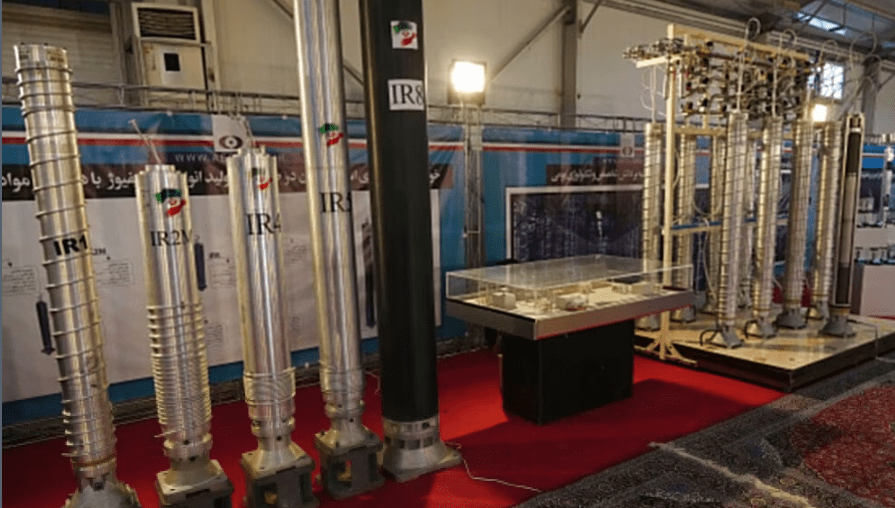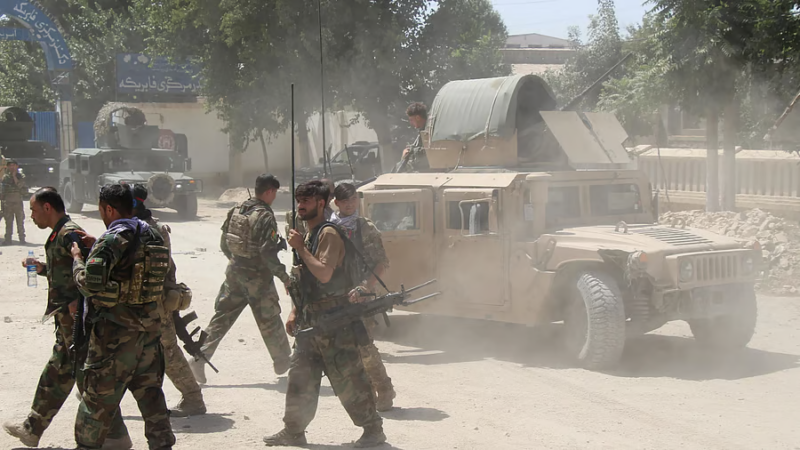With tensions in the Middle East rising, would Iran try to use its nuclear program?

LONDON —
Recent efforts to de-escalate tensions between the West and Iran over Tehran’s nuclear program have been set back by the recent Hamas terror attack on Israel, and Iran could seek to use the atomic program as leverage, according to analysts.
Western powers accuse Iran of supporting Hamas as a proxy militant group in the region, although they have not accused Tehran of direct involvement in the group’s October 7 cross-border terror attack on Israel, which killed more than 1,400 Israeli soldiers and civilians. Hamas is also holding more than 200 people hostage.
Israel’s subsequent bombing of Hamas targets in Gaza had killed almost 6,500 people as of Wednesday, according to Palestinian health officials, including more than 2,700 children.
Prior to the Hamas attack, relations between the West and Iran appeared to be cautiously improving. In September, the United States agreed on a prisoner swap with Tehran, brokered by Qatar. Five prisoners were exchanged on each side and Washington agreed to release $6 billion of frozen Iranian assets. The U.S. refroze that money following the attack by Hamas, which Washington has designated as a terrorist group.
“It was widely expected that after the detainee deal between Iran and the United States – and the de-escalatory understanding that the two countries had, which had brought about a much calmer context – that there was room for direct negotiations towards the end of October between Iran and the U.S., in Oman,” said Ali Vaez, Iran Project director at the International Crisis Group in Washington. “But that, I think, is now completely off the books, and there is probably no political space left for direct engagement between the two countries.”
Whether there is engagement or not, Vaez continued, “the Iranian nuclear issue remains a major crisis, and I think the last thing that the Biden administration needs in the coming year, as it deals with the war between Israel and Hamas and the war in Ukraine, is a nuclear crisis in the Middle East.”
Future engagement
U.S. President Joe Biden is unlikely to seek further engagement with Iran on the nuclear program, according to Peter Jenkins, a former British ambassador to the U.N. nuclear watchdog, the International Atomic Energy Agency, or IAEA.
“If Iran gets blamed, at least in part, for those [Hamas] attacks because those militias are considered to be Iran-backed, then I find it very hard to imagine that the Biden administration would want to expose itself to attack from the public or especially from Republicans in Congress and from Israel, or from Israeli lobbies like AIPAC, by opening negotiations with Iran,” Jenkins told VOA.
AIPAC is the American Israel Public Affairs Committee, a bipartisan, pro-Israel political action committee and lobbying group.

Iran is also unlikely to seek further talks, he added. “The current Iranian administration is not an enthusiast for the JCPOA. And what’s just happened is that the United States has refrozen $6 billion – belonging to Iran, but long frozen – which the Biden administration had promised, pledged to unfreeze in return for the release of hostages. I assume that in Tehran people are feeling rather incensed about that,” Jenkins told VOA.
He was referring to the 2015 Iran nuclear deal, known formally as the Joint Comprehensive Plan of Action.
The West should not treat the Iranian nuclear threat in isolation from other concerns such as Tehran’s support for militant proxies like Hamas, argued Behnam Ben Taleblu, an analyst with the Foundation for Defense of Democracies in Washington.
“For me, the concern is a larger picture of both sides of the Atlantic disconnecting the dots between the patron [Iran] and proxy problem and between the politics of the major Iran issue of the day: the JCPOA, the general issue of sanctions relief, and the more localized nature of the conflict. I think this disconnecting the dots is unhelpful to seeing the bigger picture as it’s quite literally now unfolding in Gaza and in Israel,” Taleblu told VOA.
JCPOA talks
Talks in Vienna to revive the nuclear deal stalled last year, although neither side has said the negotiations are officially finished.
Then-U.S. President Donald Trump withdrew the United States from the JCPOA in 2018, saying it had failed to halt Iran’s enrichment activities or curb its missile program and support for militant proxies in the region.
Tehran stopped complying with its commitments under the JCPOA soon afterward and removed the IAEA monitoring equipment in June 2022 while blocking some nuclear inspectors from visiting the country.
The IAEA said in its latest report published in August that Iran was continuing to enrich uranium up to 60 percent purity, short of 90 percent weapons-grade fuel.
“Iran’s decision to remove all of the agency’s equipment previously installed in Iran for JCPOA-related surveillance and monitoring activities has also had detrimental implications for the agency’s ability to provide assurance of the peaceful nature of Iran’s nuclear program,” the IAEA report said.

Nuclear fuel enrichment
Following the prisoner swap in September, Iran tentatively agreed to halt the stockpiling of some enriched uranium, Vaez said.
“As part of the de-escalatory understanding between Iran and the U.S., Iran stopped accumulating additional 60% enriched uranium. Well, that might now change, given the rising tensions between the two sides,” he said.
Further enrichment of uranium from 60 to 90 percent purity could take place in a matter of days.
“It would take Iran less than a week to enrich enough uranium for a single nuclear weapon. That is down from more than 12 months when President Trump withdrew from the 2015 nuclear deal. And that’s why this is literally a ticking bomb and there needs to be a solution one way or another to curb Iran’s nuclear activities,” Vaez told VOA.
‘No correlation’
IAEA chief Rafael Grossi recently told CNBC that he saw “no correlation” between the Israel-Hamas war and Iran’s nuclear program.
“I don’t see a correlation between these two things,” Grossi said in an October 20 interview. “If you look at the bigger picture in terms of security and the conflict between Israel and the Palestinians, we have seen moments of increased tension, and this has not resulted in a direct change or shift when it comes to what happens in Iran.”
Jenkins, the former British ambassador to the IAEA, said there were no signs yet that Iran is seeking a nuclear bomb. “There is still no evidence from the IAEA, whose inspectors continue to visit Iranian plants at very frequent intervals, or from the American intelligence community, which tends to make public its assessments — there’s still no evidence that Iran is contemplating a move away from compliance with its essential Nuclear Non-Proliferation Treaty commitment, which is to refrain from manufacturing nuclear weapons,” he said.
Leverage
Tehran could seek to use its nuclear program as leverage against the West, as tensions increase in the region.
“I can imagine them looking for ways of increasing concern and anxiety in the West about their nuclear program, but stopping short of actually, shall we say, crossing the line and ceasing to be in compliance with the Nuclear Non-Proliferation Treaty. That is, after all, the game they’ve been playing for the last five years. Bit by bit, they’ve been increasing the level at which they are enriching uranium,” Jenkins told VOA.
Meanwhile, Israel has repeatedly said it will not allow Iran to develop a nuclear weapon.
Israel itself is widely believed to have atomic weapons, although it does not allow IAEA inspections of its nuclear sites and is not a signatory to the accord.






